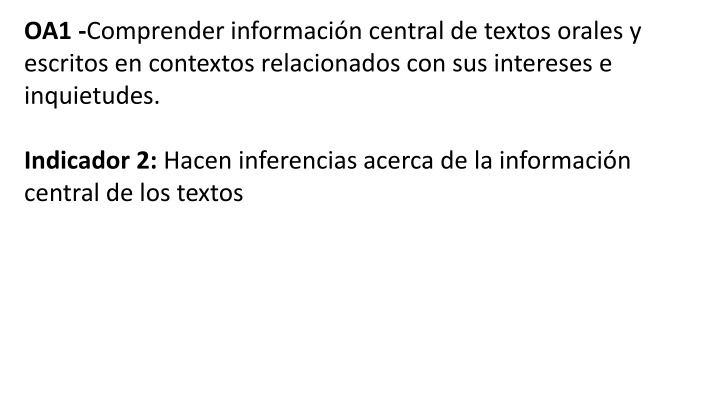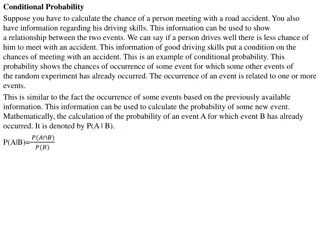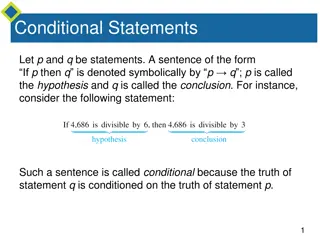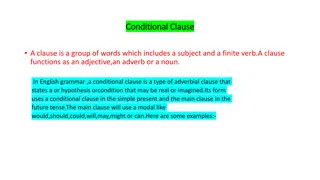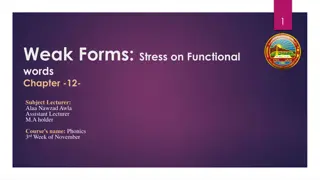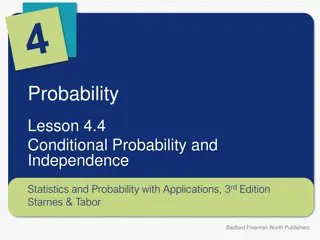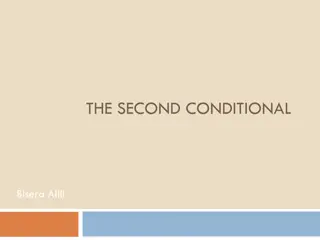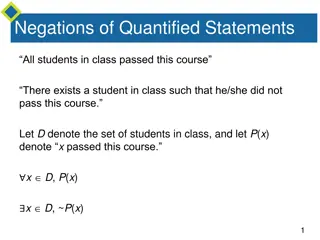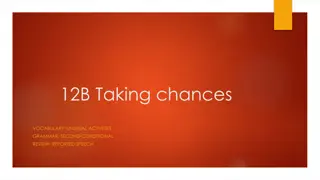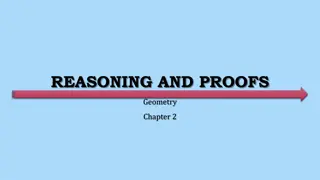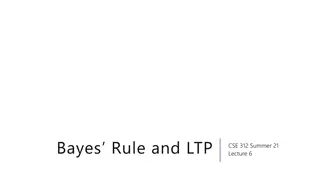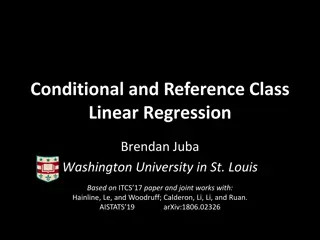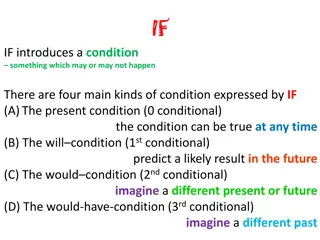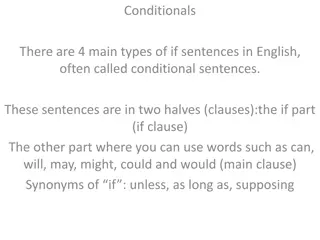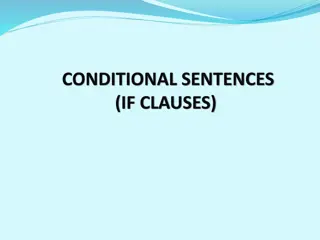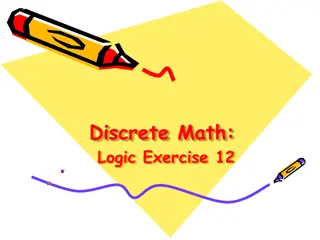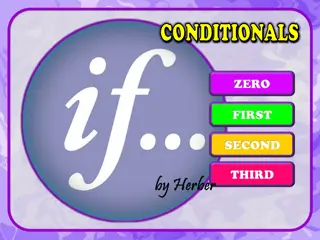Conditional Forms in English
Comparison between zero and first conditional forms in English, highlighting the differences and when to use "if" or "when" in specific situations. Examples provided for better comprehension of each conditional type.
Download Presentation

Please find below an Image/Link to download the presentation.
The content on the website is provided AS IS for your information and personal use only. It may not be sold, licensed, or shared on other websites without obtaining consent from the author.If you encounter any issues during the download, it is possible that the publisher has removed the file from their server.
You are allowed to download the files provided on this website for personal or commercial use, subject to the condition that they are used lawfully. All files are the property of their respective owners.
The content on the website is provided AS IS for your information and personal use only. It may not be sold, licensed, or shared on other websites without obtaining consent from the author.
E N D
Presentation Transcript
OA1 -Comprender informacin central de textos orales y escritos en contextos relacionados con sus intereses e inquietudes. Indicador 2: Hacen inferencias acerca de la informaci n central de los textos
OTHER FORMS OF CONDITIONALS In the last class we learnt about how to form zero and first conditional and what they uses are. Zero IF .. + PRESENT .. + PRESENT IF YOU FEEL SICK, GO TO THE DOCTOR First IF .. + PRESENT . + FUTURE. IF IT DOESN T RAIN, I WILL GO CAMPING.
Zero vs First Conditional : The first conditional describes a particular situation, whereas the zero conditional describes what happens in general. For example (zero conditional): if you sit in the sun, you get burned (here I'm talking about every time a person sits in the sun - the burning is a natural consequence of the sitting) But (first conditional): if you get in traffic jam, you will be late for work. (here I'm talking about what happens in the momente, will a posterior consequence)
But there are another forms of presenting conditional forms. WHEN instead of IF There are some forms of conditional in which it is better to use word WHEN instead of IF (Hay algunas formas de condicional en las cuales es mejor usar la palabra Cuando en vez de SI) Ex. I open the door IF someone knocks (Yo abro la puerta SI alguien toca) I open the door WHEN someone knocks (Yo abro la puerta CUANDO alguien toca)
In zero conditional, IF works as a condition of a fact. (en cero condicional, IF funciona como condici n de un hecho) If I drink coffee at night, I can t sleep (SI tomo caf de noche, no puedo dormir) But WHEN works as a natural reaction of a fact. (pero CUANDO funciona como una reacci n natural a un heho) WHEN I drink coffee at night, I can t sleep (CUANDO tomo caf de noche, no puedo dormir)
NEVERTHELESS, IN FIRST CONDITIONAL THE USE OF WHEN WORKS SPECIFICALLY IN ACTIONS WHERE THERE IS A FULL CERTAINTY OF THE RESULT TO HAPPEN. (SIN EMBARGO, EN EL PRIMER CONDICIONAL EL USO DEL CUANDO ES ESPECIFICAMENTE EN ACCIONES DONDE HAY UNA CERTEZA ABSOLUTA DEL RESULTADO A OCURRIR) EX. IF I FINISH HIGH SCHOOL, I WILL GO TO COLLEGE (si termino el colegio, ir a la universidad) (in here we see the results is certain only if the condition occurs) WHEN I FINISH HIGH SCHOOL, I WILL GO TO COLLEGE (cuando termine el colegio, ir a la universidad) (in here we see the results will happen because the condition is real too)
In first conditional we can also use another forms to replace WILL (en el primer condicional tambi n podemos usar otras formas para reemplazar el WILL) FORM USE EXAMPLE PROMISE BE GOING TO (ir a .) IF YOU DON T STUDY, YOU ARE GOING TO GET BAD GRADES (si no estudias, vas a obtener malas notas) RECOMMEND SHOULD (deber as) IF YOU HAVE TIME, YOU SHOULD STUDY (si tienes tiempo, deber as estudiar) PROBABILITY MIGHT (puede que) IF IT DOESN T RAIN, I MIGHT WASH THE CAR ON SUNDAY (si no llueve, puede que lave el auto el domingo) OBLIGATION MUST (debes) IF YOU ARE SICK, YOU MUST SEE A DOCTOR (si estas enfermo, debes ver a un doctor)
First conditional with UNLESS Unless is similar in meaning to if not and can be used instead of if not in certain types of conditional sentences. Like if, unless is followed by the condition, in this case present tense. Ex. 1.- If I am free this evening, I will watch the match. I will not watch the match Unless I am free this evening. Ex. 2.- You will feel cold Unless you wear a warm jacket. You will feel cold If you don t wear a warm jacket
Lets practice Analyse these sentences and decide whether to use IF or UNLESS. Focus on the context.
Lets practice Analyse these sentences and decide whether to use IF or UNLESS. Focus on the context.
Complete using either IF, UNLESS depending on the context. 1.- I will not to pass the exams _________ I study hard . 2.- We will not walk to downtown ___________ the sun is shining hard. 3.- Mom takes him to the doctor__________ he has temperature,. 4.- I will not be very happy __________ my friends come. 5.- ___________ she earns a lot of money, she won t fly to New York. 6.- We will visit the museums in London __________ we don t have the time. 7.- You will slip on the rocks _______ you wear sandals. 8.- __________ Rita forgets her homework, the teacher gives her a low mark. 9.- They will listen to loud music _______ they are in a hospital. 10.- ____________ you wait, I will have the answer.
